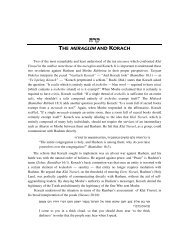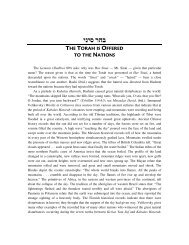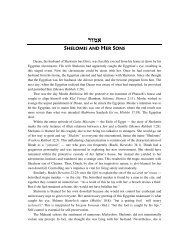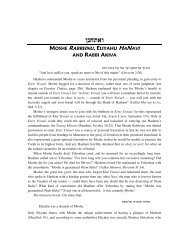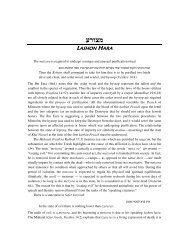The Nazir - Parsha Illuminations
The Nazir - Parsha Illuminations
The Nazir - Parsha Illuminations
You also want an ePaper? Increase the reach of your titles
YUMPU automatically turns print PDFs into web optimized ePapers that Google loves.
נשא<br />
THE NAZIR<br />
<strong>The</strong> Torah introduces the unusual concept of <strong>Nazir</strong> —<strong>Nazir</strong>ite—with the pasuk:<br />
איש או אשה כי יפלא לנדר נדר נזיר להזיר לה'<br />
When either man or woman utter a vow of a <strong>Nazir</strong>, to separate themselves to<br />
Hashem (Bamidbar 6:2).<br />
<strong>The</strong> <strong>Nazir</strong> is subject to three limitations:<br />
a) He may not drink wine.<br />
b) He may not cut his hair.<br />
c) He may not become tamei (ritually impure due to contact with the dead).<br />
Rabbeinu Bechaya (ibid.) explains that abstinence from wine helps a man to curtail his<br />
materialistic desires. When he refrains from trimming his hair or beard, when he is, in essence,<br />
careless about his appearance, he will effectively drive away his desires. <strong>The</strong> Rambam (Moreh<br />
Nevuchim 3:48) emphasizes the importance of denying oneself the pleasures of the vine: “for it<br />
has killed the many and the mighty.” <strong>The</strong> <strong>Nazir</strong> is thereby elevated to a status of holiness, similar<br />
in station to that of the Kohein Gadol. Hence, like the Kohein Gadol, he may not become ritually<br />
impure through contact with the dead.<br />
<strong>The</strong> Seforno (Bamidbar 6:8) extols the <strong>Nazir</strong> as an individual who wishes to separate himself<br />
from materialism. His abstinence is to be limited to wine-drinking and hair-trimming, nothing<br />
more. Hashem wants the <strong>Nazir</strong> to limit his sinful behavior; Hashem has no wish to effectively<br />
limit all worldly and natural desires. Tormenting one’s body is sinful and prohibited, but a sincere<br />
desire to come close to Hashem by altering one’s behavior approaches holiness.<br />
Conviviality is the key to jovial, affable social interactions. But a <strong>Nazir</strong> is forbidden to be<br />
present at any celebration or function at which alcohol is normally served; this, in effect, stifles<br />
all his social companionship. He has more time, therefore, to concentrate on tefilah, Torah<br />
learning and increased yiras Shamayim—fear of Heaven. So too, his hirsute growth results in the<br />
“crown of his G-d . . . on his head” (Bamidbar 6:7). His slovenly appearance marks him and<br />
limits his contact with civil society. <strong>The</strong> final injunction revolves around not visiting cemeteries.<br />
Again, this is another limitation on his activities, allowing him a maximum amount of private<br />
time to devote to Hashem. Having said all this, Chazal nevertheless convey a negative attitude<br />
towards the <strong>Nazir</strong>. Rabbi Eliezer Hakapor claims the <strong>Nazir</strong> is “sinning against his own soul,” for<br />
any kind of self-denial is only the work of a sinner (Nedarim 10•). Rabbi Shimon writes that the<br />
original pious Jews avoided Nezirus in order that they not be called “sinners” (ibid.). Rabbi<br />
Shimon Hatzadik never, except for one unique circumstance, ever partook of a defiled <strong>Nazir</strong>’s<br />
sacrifice, for he felt it was the sacrifice of a sinner (ibid. 9:; see Tosfos Bava Kama 91:). Rabbi<br />
Eliezer Hakapor comments that if one places himself in distress through an act of self-denial he is
called a sinner (Ta’anis 11•). Rabbi Yosi says that it is forbidden for a man to torment himself by<br />
fasting (ibid. 22:).<br />
In the Nevi’im three individuals are presented as being Nezirim: Shimshon (Shoftim 13:7),<br />
Shemuel (I 1:11), and Avshalom (Shemuel II 14:25). Shimshon was a unique historical figure, a<br />
great Shofeit —Judge— a potential candidate for Melech Mashiach (Bereishis Rabbah 98:14), yet<br />
he did exhibit certain shortcomings (see page 421). Shemuel was truly dedicated to Hashem, and<br />
he was holy in the highest sense of the term. Avshalom was a scoundrel who led a rebellion<br />
against his father, David Hamelech.<br />
<strong>The</strong> Navi Amos (2:11,12) complained to Klal Yisrael that “I have raised up prophets from<br />
among your sons, and Nezirim from among your young men . . . But you gave the Nezirim wine<br />
to drink, and commanded the prophets, saying, ‘Prophesy not.’ ” <strong>The</strong> Ramban (Bamidbar 6:11)<br />
comments that Amos presents a parallel in holiness between the prophet and <strong>Nazir</strong>.<br />
Shimon ben Shetach, brother-in-law of Yannai Hamelech and brother to Shelomis Hamalka<br />
(Berachos 48•), pleaded with the king to subsidize the <strong>Nazir</strong> karban for three hundred poor<br />
Nezirim, who could not afford the cost of the sacrifice (Yerushalmi <strong>Nazir</strong> 23:3). Helena, the<br />
converted queen of Adiabene (Chadaya) (first century C.E.), declared herself a <strong>Nazir</strong> for seven<br />
years to demonstrate her purity. When she arrived in Eretz Yisrael to offer her sacrifices she was<br />
informed that Nezirus is invalid outside of Eretz Yisrael. She consented to undergo an additional<br />
seven years of Nezirus in Eretz Yisrael (ibid. 15:). It becomes obvious that historically Nezirim<br />
did exist in Klal Yisrael.<br />
<strong>The</strong> Chovos Halevavos (Sha’ar Haprishus 6) parallels the separation of the <strong>Nazir</strong> within the<br />
context of the separation of the Shabbos from the mundane world. On Shabbos a man’s mind is<br />
free of materialistic pursuits so that he may be free to seek perfection. Similarly, a <strong>Nazir</strong> is<br />
separated from this world so that he will abstain from worldly striving and instead focus on<br />
achieving greater spiritual heights. Why then must a <strong>Nazir</strong> bring a sin-offering “when the days of<br />
his Nezirus are fulfilled” (Bamidbar 6:13)? <strong>The</strong> Ramban (ibid. 11) explains that “until now<br />
[during his <strong>Nazir</strong>ite tenure] he was separated in sanctity and [in] the service of Hashem, and he<br />
should therefore have remained separated forever.” Thus, when he completes his period of<br />
Nezirus he requires atonement because he goes back to be defiled by the material desires of the<br />
world.<br />
<strong>The</strong> Rambam (Hilchos Dei’os 3) lays down a framework for everyday living. <strong>The</strong>se are rules<br />
of behavior which are applicable to everyone who seeks to get close to Hashem. Everything<br />
taught by the Rambam is contrary to the concept of <strong>Nazir</strong>. <strong>The</strong> Rambam seems to indicate that the<br />
<strong>Nazir</strong> has no real place in Torah life. <strong>The</strong> Chinuch (365) points out that man must serve Hashem<br />
with the facilities given to him. Man is invested with physical matter and spiritual intelligence,<br />
and he is obligated to serve Hashem within these parameters. To create an artificial state of<br />
existence is not the intent of creation. <strong>The</strong> <strong>Nazir</strong>, to a large extent, denies a certain facet of man<br />
which should be used in the service of Hashem. Hence, he is labeled a sinner.<br />
<strong>The</strong> Kuzari (Sha’ar 5) affirms that an individual who seeks ascetic solitude brings only<br />
distress and sickness upon his body and soul. <strong>The</strong> human condition demands a variety of<br />
behavioral rites of a person. It is natural for man to have an urge to see and hear new things, to<br />
converse with others, to keep occupied, and even to accumulate wealth. <strong>The</strong> human body<br />
demands food and cohabitation, companionship, and social undertakings. <strong>The</strong> person who lives in
seclusion and abstains from these things is in conflict with his human nature, and his life is filled<br />
with regret and frustration. <strong>The</strong>refore, the Kuzari concludes that this individual will regret his<br />
abstention, which will in turn remove himself even further from the Divine Influence for which<br />
he so earnestly sought and strived (see Maharal, Nesivas Olam, Nesiv Hateshuvah 7).<br />
In essence, the <strong>Nazir</strong> torments himself in a limited fashion in order to get close to Hashem.<br />
He denies himself the pleasure of wine with all its social ramifications, he sets himself apart from<br />
society with his unkempt appearance, and he segregates himself from social intercourse, to the<br />
extent that he is no longer just another cog in society. Obviously, Nezirus is a controversial<br />
concept and must be understood in proper context.<br />
<strong>The</strong> Gemara (Sanhedrin 99:) reveals a remarkable secret of Olam Hazeh by analyzing a<br />
pasuk in Mishlei:<br />
But man is born for trouble (Iyov 5:7).<br />
כי אדם לעמל יולד<br />
Chazal confirm an immutable fact of life: man is born to suffer. This suffering can take place in<br />
one’s everyday conventional activity or, ideally, it can be voluntarily directed to the acquisition of<br />
Torah.<br />
“He who forfeits joy in this world, is guaranteed joy in the next world” (Avos D’Rabbi Nasan<br />
28:5). Implicit in this idea is the notion that it is a virtue to forgo joy in this world.<br />
אחרית שמחה יגון ואנחה<br />
Joy is always followed by pain and grief (Gevul Binyamin 3, 48:1).<br />
This indicates that joy is not substantive in and of itself, it is merely superficial, for pain and grief<br />
are always in its aftermath. <strong>The</strong> Gemara states, “Hashem reviewed all the good qualities in order<br />
to give them to Israel, but the only good quality He found befitting Israel was poverty” (Chagigah<br />
9:). Suffering derived from Divine love is an essential element in human spiritual advancement. It<br />
is an aspect of Hashem’s grace, a great gift and a great privilege. Nevertheless, when great men<br />
were asked:<br />
they responded:<br />
“Do you appreciate suffering?”<br />
“Neither the suffering nor its reward!” (Berachos 5:).<br />
חביבין עליך יסורין<br />
לא הן ולא שכרן<br />
<strong>The</strong> Mesilas Yesharim presents three brilliant chapters on the concept of perishus —<br />
separation from worldly matters. He explains that “the majority of the people cannot be saintly<br />
[i.e. Nezirim]. It is enough if they are righteous” (13). He teaches that by and large “man was<br />
created to enjoy [this world],” of course in a kosher sense. Hashem declared that “everything that<br />
He had made was very good” (Bereishis 1:31). It means that He wants mankind to enjoy His<br />
munificence and benevolence. This world is replete with Torah-affirming pleasures, and man was<br />
intended to enjoy every bit of them.<br />
At the conclusion of most days of creation Hashem remarked “It is good” (Bereishis 1:4).<br />
<strong>The</strong> final day of creation is crowned with the exultation: “It is very good” (Bereishis 1:31). <strong>The</strong>
Midrash (Bereishis Rabbah 9:2) is moved to exclaim: “He had made everything beautiful ...”<br />
(Koheles 3:11). Hashem created everything good and beautiful so that man may enjoy this world.<br />
For the good and beautiful is only a small reflection of Hashem, and appreciation of Hashem’s<br />
work is the primary method by which mankind is to come to recognize and appreciate Him.<br />
Mankind is further commanded to “rejoice in every good thing which Hashem has given you”<br />
(Devarim 26:11). It is the will of Hashem that mankind enjoy this world and come to appreciate<br />
Him.<br />
How does separation, suffering, and vicissitude come into this beautiful, enjoyable world?<br />
Life is definitely not about suffering — it is to be enjoyed — but in every life there must be a<br />
certain degree of suffering in order to gain Olam Haba. This allocated suffering is inevitable, but<br />
certainly not a contradiction to the enjoyment Hashem bestows upon mankind. If one must suffer,<br />
would it not be wise to suffer in the service of Hashem? Would it not be wonderful if this pain<br />
and suffering could be expended in the acquisition of Torah (Sanhedrin 99:)? If a certain degree<br />
of pain is necessary in this lifetime, why not focus it in the direction of spiritual achievement? If<br />
one must experience an “X” amount of suffering, why not do it as a <strong>Nazir</strong>, and then hopefully<br />
have satisfied that “X” quotient, and at the same time, achieve a significant spiritual elevation?<br />
My Rebbe, Harav Avigdor Miller "א suggested the following two anecdotes to illustrate<br />
the aforementioned point.<br />
Rabbi Akiva was imprisoned by the Roman authorities for teaching Torah at public<br />
assemblies. A short time later, his ideological opponent, Papas ben Yehudah, was also led into the<br />
prison, whereupon Papas declared, “Praised are you Rabbi Akiva, for you were punished on<br />
account of teaching Torah; woe is to Papas who was punished for committing foolishness”<br />
(Berachos 61:). It was ordained by Heaven that both Rabbi Akiva and Papas must undergo a<br />
certain amount of tribulation in this world. Papas squandered his punishment in the pursuit of<br />
vanity. Rabbi Akiva earned his punishment with the acquisition of Torah.<br />
Rabban Yochanan ben Zakkai dreamed that his nephew would have property confiscated by<br />
the Roman government. Rabbi Yochanan coerced and arm-twisted his nephew into donating large<br />
sums of money to charity, without revealing the dream to him. A short time later the government<br />
did indeed confiscate a small sum of money from the nephew. This sum represented the<br />
difference between the large sums donated to charity and the total monetary value revealed to<br />
Rabban Yochanan ben Zakkai in the dream (Bava Basra 10•). If Heaven destines that a certain<br />
sum of money will be lost, that money will be lost. Is it not wise to lose it in the very best way<br />
possible? Donation to charity is the service of Hashem, while mere confiscation is certainly a<br />
wasted opportunity for suffering.<br />
Not every individual is up to self-imposed suffering. By and large, everyone wants to enjoy<br />
the bounty Hashem has to offer. <strong>The</strong> unique individual who wants to attain additional holiness,<br />
while at the same time expending his allotted quotient of suffering, was given the option of<br />
becoming a <strong>Nazir</strong>.<br />
aA<br />
שליט



